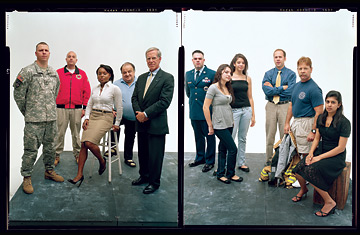
As the Constitutional Convention of 1787 came to a close, after three and a half months of deliberation, a lady asked Dr. Franklin, "Well, Doctor, what have we got, a republic or a monarchy?" "A republic," replied the Doctor, "if you can keep it."
— ANECDOTE FROM THE RECORDS OF THE FEDERAL CONVENTION OF 1787, ED., MAX FARRAND, VOL. 3, APPENDIX A, 1911
A republic, if you can keep it. The founders were not at all optimistic about the future of the Republic. There had been only a handful of other republics in all of human history, and most were small and far away. The founders' pessimism, though, came not from history but from their knowledge of human nature. A republic, to survive, needed not only the consent of the governed but also their active participation. It was not a machine that would go of itself; free societies do not stay free without the involvement of their citizens.
Today the two central acts of democratic citizenship are voting and paying taxes. That's basically it. The last time we demanded anything else from people was when the draft ended in 1973. And yes, there are libertarians who believe that government asks too much of us — and that the principal right in a democracy is the right to be left alone — but most everyone else bemoans the fact that only about half of us vote and don't do much more than send in our returns on April 15. The truth is, even the archetype of the model citizen is mostly a myth. Except for times of war and the colonial days, we haven't been all that energetic about keeping the Republic.
When Americans look around right now, they see a public-school system with 38% of fourth graders unable to read at a basic level; they see the cost of health insurance escalating as 47 million people go uninsured; they see a government that responded ineptly to a hurricane in New Orleans; and they see a war whose ends they do not completely value or understand.
But there is something else we are seeing in the land. Polls show that while confidence in our democracy and our government is near an all-time low, volunteerism and civic participation since the '70s are near all-time highs. Political scientists are perplexed about this. If confidence is so low, why would people bother volunteering? The explanation is pretty simple. People, especially young people, think the government and the public sphere are broken, but they feel they can personally make a difference through community service. After 9/11, Americans were hungry to be asked to do something, to make some kind of sacrifice, and what they mostly remember is being asked to go shopping. The reason private volunteerism is so high is precisely that confidence in our public institutions is so low. People see volunteering not as a form of public service but as an antidote for it.
That is not a recipe for keeping a republic.
Another reality the founders could not have possibly foreseen was that a country that originally enslaved African Americans would be a majority non-white nation by 2050. Robert Putnam, the famed Harvard political scientist who wrote about the decline of civic engagement in Bowling Alone, recently released a new study that showed the more diverse a community is, the less people care about and engage with that community. Diversity, in fact, seems to breed distrust and disengagement. The study lands in the midst of a rackety immigration debate, but even if all immigration were to cease tomorrow, we would still be diverse whether we liked it or not. Yet the course of American history, Putnam writes, has always given way to "more encompassing identities" that create a "more capacious sense of 'we.'"
But at this moment in our history, 220 years after the Constitutional Convention, the way to get citizens involved in civic life, the way to create a common culture that will make a virtue of our diversity, the way to give us that more capacious sense of "we" — finally, the way to keep the Republic — is universal national service. No, not mandatory or compulsory service but service that is in our enlightened self-interest as a nation. We are at a historic junction; with the first open presidential election in more than a half-century, it is time for the next President to mine the desire that is out there for serving and create a program for universal national service that will be his — or her — legacy for decades to come. It is the simple but compelling idea that devoting a year or more to national service, whether military or civilian, should become a countrywide rite of passage, the common expectation and widespread experience of virtually every young American.
In 2006 more than 61 million Americans dedicated 8.1 billion hours to volunteerism. The nation's volunteer rate has increased by more than 6 percentage points since 1989. Overall, 27% of Americans engage in civic life by volunteering. Dr. Franklin would be impressed. The service movement itself began to take off in the 1980s, and today there is a renaissance of dynamic altruistic organizations in the U.S., from Teach for America to City Year to Senior Corps, many of them under the umbrella of AmeriCorps. In a 2002 poll, 70% of Americans thought universal service was a good idea. And while it's easy to sit back and say this to a pollster, the next President can harness the spirit of volunteerism that already exists and make it a permanent part of American culture.